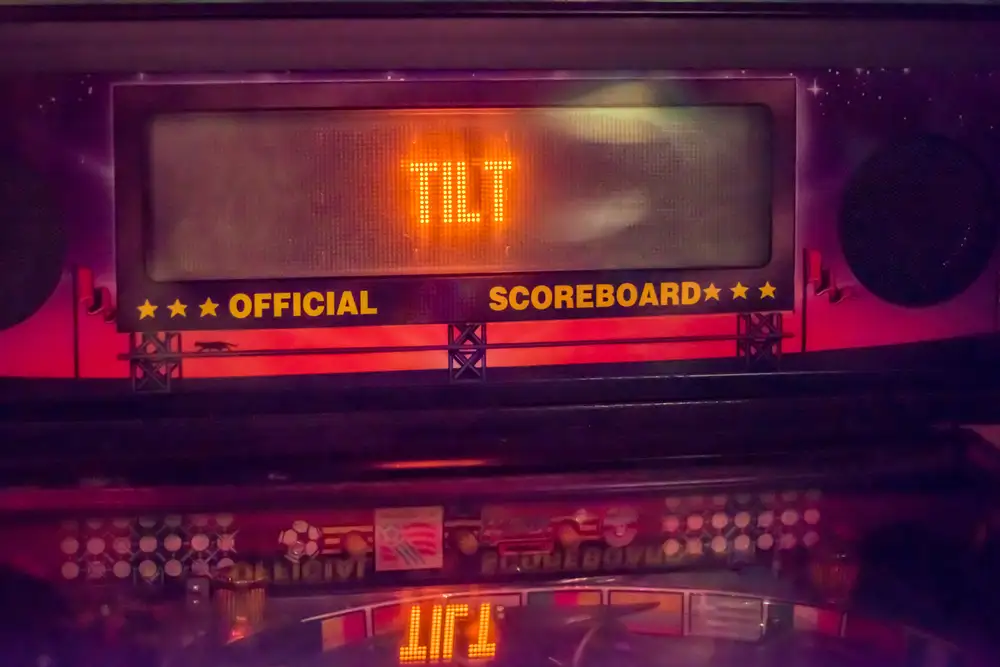Online Poker Tilt and How to Avoid It
 Reviewed by WSOP Winner Chris ‘Fox’ Wallace
Reviewed by WSOP Winner Chris ‘Fox’ Wallace
There are many concepts to master to become a successful poker player, but one holds the key to your ultimate success and it has nothing to do with cards. The ability to keep your emotions in check – to avoid tilt – will go a long way towards determining how successful you will be.
Tilt is the poker phenomenon of playing poorly due to emotional distress, usually anger, caused by a combination of any number of events: bad beats, bluffs gone awry, long stretches of being card dead, losing a series of “coin flips”, losing to a perceived lesser player, or just reacting badly to something said by an opponent. All of these events, including events not even related to poker, can cause a player to start losing emotional control.
Avoiding tilt is important because poker is a game of decisions and, like drugs or alcohol, anger impairs your ability to think rationally and logically. If your ability to think is impaired, then you will not be on your “A” game. It is imperative you be at your best when you sit a table – whether that’s in a casino or in an online poker room.
The Spectrum of Tilt
Tilt is best looked at as a spectrum of behaviors. On one end of the spectrum is peace and happiness. At the other extreme is uncontrollable rage. In between are the various levels of emotion, such as sadness, disappointment, irritation, frustration, annoyance and anger.
All poker players should aim to be as close to the peace and happiness side of the spectrum as possible. Maintaining that mindset means you are thinking clearly and making the best possible decisions. As you get closer to the rage end of the spectrum, you begin losing the ability for rational thought, which inevitably leads to worse results.
Poker is not a game that can be played by instinct alone. Poker is a game that relies on intellect and requires a high level of critical thinking.

Check Your Baggage at the Gate
Most players tend to view tilt as a reaction to events that happen exclusively while playing poker, but that is not the case. We’re all human, and most of us are lugging around emotional baggage of one sort or another. We may have gotten a bad review from our supervisor, found out the drive-thru forgot to include the apple pie we had ordered for dessert, or had to deal with an issue from a child or spouse.
All of these things will impact your emotional level when you are ready to play. You might not even realize it, but you may have advanced up the tilt spectrum before you even buy in. This means your ability to think clearly and make rational decisions is compromised before you even see a card.
As a result, it is important to check your emotional state before you begin to play. If you are not in a good mood, take some time to try to find a happy place. Watch some amusing videos, check your social media, or take a brisk walk to clear your mind. Exercise has been shown to release endorphins, a natural drug that elevates your mood. The walk will not only burn calories, which will make you feel better about yourself, but it will also improve your play by helping you get into the proper mindset.
Getting in the proper emotional state before you start playing is critical to controlling tilt, which is always lurking in the background just waiting for an excuse to come flying out. And as poker author Tommy Angelo puts it, poker tilt isn’t really any different to regular “life-tilt”.
People ask me how to end tilt and I say you can’t. Even a billion dollars wouldn’t do it. You’d still be upset if you were stuck in traffic and late. Oh, are we talking about poker tilt? And not regular-life tilt? Aren’t they caused by the same thing? I think they are. That’s why I like to think of regular life as where I go to practice tilting less at poker. Or the other way around. See what I mean? Why do we get upset when we lose? Or play bad? Or get sucked out on? Where does frustration and disappointment and impatience come from? What is the cause of our many dissatisfactions? From wishing things were, are, or will be different than they were, are, or will be. That’s the cause. So even though it’s impossible to do, I try to accept things as they are. A little more today than yesterday. It’s basically like training for suckouts and traffic jams.

Recognize the Cause and the Symptoms
Tilt occurs gradually. You don’t generally go from one end of the spectrum to the other in seconds. Most poker players understand their cards are not always going to hold up and can stomach a bad beat or a missed draw. Tilt starts to seep in when a player experiences a series of these events in a short amount of time.
Each player has his or her own unique set of tilt triggers. The most common triggers are bad beats, which can induce anger, and long spells of being card dead, which can induce frustration.
To recognize where you are on the tilt spectrum, start watching your reactions when one of your trigger events occurs.
- If you shrug your shoulders and move on to the next hand when your opponent hits a two-outer on the river, then you’re in the right state of mind.
- If you feel compelled to type a snarky comment into the chat box or criticize the play of the person who sucked out on you, that should be a warning that you are starting to advance up the tilt spectrum.
Identifying the warning signs early is a key, says Jared Tendler, an internationally acclaimed mental game coach who has worked with hundreds of poker players and professional golfers.
Tendler says it is easier to overcome tilt if you can catch it early because your brain is still capable of logical and rational thought and can activate your prepared strategies for combating tilt. If you don’t figure out you’re on tilt until you slam your mouse down or throw your chips angrily into the pot, it may be too late to get back under control.
When your emotions rise too high the brain is designed to shut off higher level thinking. You can’t think because the brain has shut off your ability to as part of what’s commonly known as the fight/flight mechanism. Nobody has control over this brain function. The only thing you can do is control your anger from getting to the point where your thinking goes away.

Strategies for Subduing Tilt
Now that you have learned what tilt is and identified your personal tilt early warning signs, the next step is to devise a strategy to help you avoid it.
If You Feel Yourself Starting to Get Upset During Play
- The first thing to do is simply to push back from your keyboard or table, close your eyes and take a few deep breaths while visualizing something relaxing.
- Another simple step is to develop a phrase that you repeat to calm yourself. Examples are: “Take it easy.” “The cards will come.” “You know what you’re doing.” “I made the correct play and it just didn’t work out.”
- These phrases should be focused on you and should be positive in nature. Repeating one or two of those phrases can help redirect your mental energy and get you focused again so you can stay on top of your emotions and on top of your game.
If These Steps Aren’t Enough, It’s Probably Time to Take a Break
Get up and leave the table or computer and spend a few minutes doing something – anything – to get your mind off the bad beat you just suffered or the idiot who called your perfectly executed bluff with bottom pair.
If you’re playing online, this is the perfect opportunity to utilize your time bank. Get up from the computer and fix yourself a snack, take out the trash, brush your teeth, unload the dishwasher – anything to clear your mind.
When you return to the table, refreshed and ready to go, do NOT go back into your hand history to see what you missed. If you find out you missed a potential big hand your frustration will return, which will defeat the entire purpose of taking a break. In this case, ignorance really is bliss.
Tilt While Playing at a Casino
If you’re at a casino, tell the dealer you’re going to take a break, then walk to the nearest bathroom and splash some cold water on your face.
Missing a few hands will not kill your chance to win a tournament or rack up in a cash game, but playing those same few hands while you are in the throes of tilt could cause you to bust out of a tournament or lose your entire buy-in.
Check Your Hands
If bad beats are one of your tilt triggers, consider keeping a window with CardsChat’s Poker Odds Calculator open so that you can check to see how bad your beat really was.
Knowing that your QQ will only hold up against a suited KJ roughly two times out of three, or that your pocket 6s are only going to hold up against any two over cards slightly more than half the time, might make it easier to handle when a loss occurs.
Listen to Music to Stay Calm
Many players listen to music while they are playing in an effort to stay relaxed. A recent study of patients who were about to undergo surgery found that patients who listened to music had less anxiety and lower levels of cortisol (a hormone produced by stress) than did patients who took anti-anxiety drugs.
Whether its jazz instrumentals, pop, reggae or dubstep, listen to whatever works for you.
Quit For a While
If you have tried all of these strategies and nothing is working, then it may simply be time to call it a night BEFORE you have blown through a couple of buy-ins. Knowing when to quit is one of the most difficult decisions for poker players, whether you are on a hot streak or struggling, but it is never a bad idea to walk away if you recognize that you are in tilt mode.
For cash players, some of the worst mistakes made by players on tilt are to spend another buy-in in a cash game or move up to a higher level to try to win it all back quicker.
For tournament players, one of the worst decisions is to immediately re-enter a tournament after getting knocked out by a bad beat, especially if it is near the end of the late registration window. If your ability to play is already compromised, the last thing you need to do is put yourself into a situation where you will be short-stacked and under pressure to get a quick double up.
Few players realize that mistakes made on tilt, whether strategic or mental, are not actually caused by tilt. Tilt simply reveals them. It’s like tilt strips your skill set down to its weakest point and shows you the areas of your game where you suck the most.

Conclusion: Recognize, Devise and Execute
Tilt is like temptation. The best way for some to resist temptation is to avoid it altogether, and the same applies to tilt.
If you can learn to recognize what causes you to tilt, devise a strategy to keep tilt at bay and then – perhaps most importantly – execute that strategy as soon as you sense tilt happening, you will greatly increase your chance to have a successful poker session.